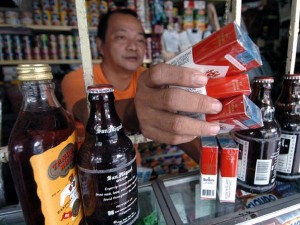
HIGHER SIN TAXES A grocer sells beer, rum and cigarettes to a customer (not shown) in Manila. Malacañang has reiterated its call for the passage of the so-called sin tax bill, saying that based on the proposed law, the government can earn P60 billion a year. AFP/JOEL NITO
MANILA, Philippines – Allies of President Benigno Aquino III were in full force at the House ways and committee hearing Wednesday to approve the proposed reforms in taxes on cigarettes and alcoholic drinks, the so-called sin taxes, that have been stymied for the past 16 years.
The decision by the Nationalist People’s Coalition (NPC) party of businessman Eduardo “Danding” Cojuangco, majority owner of market leader San Miguel Beer, to support House Bill No. 5727 and the last-minute compromise changes to the proposed sin tax reforms provided the breakthrough, House leaders said.
HB 5727 seeks to restructure the excise tax on alcohol and tobacco products, a much-needed revenue reform bill that is meant to boost the flagging collections of the Bureau of Internal Revenue.
“Although I belong to the Northern Luzon bloc which opposed the sin tax reforms because of the ill-effects on tobacco growers in our region, I had no choice but to vote for it because the NPC wanted a solid vote,” said Isabela Rep. Giorgidi Aggabao, the committee vice chair.
Committee members voted 46 to 14, with one abstention, to pass the bill shortly after finance undersecretary Jeremias Paul unveiled at the hearing the changes made to HB 5727—adopt a two-tier tax system from the original proposal of unitary tax system to replace the current four-tier system; replace proof per liter with retail price as basis for taxation; and abolish the tax advantage given to old brands.
Members of the Northern Luzon bloc and the minority denounced the “railroading” of the sin tax bill which they described as the “Luisita Express,” a reference to the sugar estate owned by the President’s family.
“This is unfair, we should be allowed to study these amendments,” said Nueva Ecija Rep. Carlos Padilla who noted that the committee has been debating the bill for the past six months.
Zambales Rep. Milagros Magsaysay said that this was no different from the “express” impeachment of Chief Justice Renato Corona which was filed, signed, verified, approved and transmitted to the Senate in less than 5 hours last December.
“We are appalled by this brazen, unabashed move to railroad the approval of the sin tax bill. We have not yet even discussed at length the considerable damage that this measure would inflict on our economy and the livelihood of millions of Filipinos dependent on the tobacco and alcohol industries. Should we just ignore the warning and voices of concern aired by various sectors over this ill-conceived bill?” said Magsaysay.
Even a member of the administration coalition, Assistant Majority Leader Magtanggol Gunigundo, said he did not agree with the move of his peers. Gunigundo maintained that the sin tax bill would burden the local tobacco and liquor industries while benefiting imported brands with lower taxes.
Ilocos Sur Rep. Eric Singson Jr. claimed that Cavite Rep. Joseph E.A. Abaya, the author of HB 5727, had sent text messages to committee members on the eve of Tuesday’s meeting which said that the President had requested their attendance and to support and vote for the sin tax bill. Abaya did not reply to the Inquirer’s query.
Manuel Mamba, the presidential legislative liaison officer, was visibly active at the sidelines during the hearing, taking a headcount of the bill’s supporters.
Rudy Salanga, president of the Philippine Tobacco Institute, said they got a hint of the plan to railroad the bill when ways and means committee chair and Davao Rep. Isidro Ungab boldly announced last week that the sin tax would be approved “before we adjourn sine die on June 7.”
In a statement, Abaya credited Aquino’s “political will” in inspiring the passage of the bill, transcending multi-partisan interests.